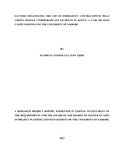| dc.contributor.author | Wambugu, Consolata JN | |
| dc.date.accessioned | 2013-11-25T15:32:50Z | |
| dc.date.available | 2013-11-25T15:32:50Z | |
| dc.date.issued | 2013 | |
| dc.identifier.citation | Degree of Master of Arts In project planning and management | en |
| dc.identifier.uri | http://erepository.uonbi.ac.ke:8080/xmlui/handle/123456789/60190 | |
| dc.description | A research project report submitted in partial fulfillment of
The requirements for the award of the degree of Master of Arts
In project planning and management of the university of Nairobi. | en |
| dc.description.abstract | Emergency contraception (EC) is a back-up birth control method that is used within 72 to 120
hours after unprotected or under protected coitus for the prevention of unintended pregnancy or
in the event of a known contraceptive failure, such as a condom breaking. Awareness about
emergency contraceptive pills does not seem to increase their use in the prevention of unwanted
pregnancies in Kenya. Incomplete knowledge on the various factors affecting the use of
emergency contraceptive pills for instance ECPs mechanism of action and their side effects leads
to misconceptions by users. Limited knowledge of emergency contraceptives and
misconceptions impact their use as issues are raised about their safety, the morality of their use,
and their effectiveness. Consequent stigmatization further hinders their use. The purpose of this
study, therefore, was to explore the factors influencing the use of emergency contraceptive pills
among undergraduate students in Kenya by studying a sample of university students who were
residents at the main Campus of University of Nairobi. The research design of this study was
descriptive survey research.The target population comprised the residential female students of
the University of Nairobi’s main campus whose total was 1976. A sample was drawn from
female students who reside in the six women hostels found in the main campus. Simple random
sampling was adopted for this study, for a sample size of 322 students derived through the
krejcie and morgan sampling technique. The students were selected randomly and equally from
the six women hostels.The research adopted a questionnaire as the instrument for data collection.
Instrument’s validity was checked by use of content validity. The Research instrument’s
reliability was done using test -retest technique. Statistical Package for Social Sciences (SPSS)
was used as a tool for data analysis and the results was presented in form of tables and
percentages to make them reader friendly. The qualitative data analysis was done using both
content and thematic analysis. The ethical issues related to the study were addressed by
maintaining high level confidentiality of the information volunteered by the respondents. The
research findings showed that more than two-thirds of students who knew about ECP’s believed
that they would use ECP’s after unprotected sexual intercourse and 63% of them agreed to
advice friends or relatives to take emergency contraceptives after unprotected sexual intercourse.
However, a considerable proportion of respondents reported their fear on using ECP’s and
misconceptions. Based on the findings, it was recommended that more information on human
sexuality, conception and contraception should be made available to female students once they
join college to eliminate misconceptions about contraceptives. In addition, an effort should be
made to promote active involvement and participation of male students/partners in the
reproductive health services. Parents, the government and non-governmental organisations could
become partners in this campaign by playing an active role, rather than be stuck in a cultural
quagmire. They could do this through education and participating in campaigns organized by the | en |
| dc.language.iso | en | en |
| dc.publisher | University of Nairobi | en |
| dc.title | Factors influencing the use of emergency contraceptive pills Among female undergraduate students in Kenya: a case of main Campus hostels of the University of Nairobi. | en |
| dc.type | Thesis | en |
| dc.description.department | a
Department of Psychiatry, University of Nairobi, ; bDepartment of Mental Health, School of Medicine,
Moi University, Eldoret, Kenya | |
| local.publisher | School of Medicine | en |

